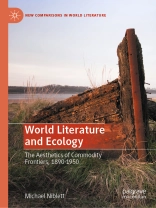Located at the intersection of world-literary studies and the environmental humanities, this book analyses how fiction and poetry respond to the ecological transformations entailed by commodity frontiers. Examining the sugar, cacao, coal, and oil frontiers in Trinidad, Brazil, and Britain, World Literature and Ecology shows how literary texts have registered the relationship between the re-making of biophysical natures and struggles around class, race, and gender. It combines a materialist theory of world-literature with the insights of the world-ecology perspective to generate compelling new readings of writers such as Rhys Davies, Yseult Bridges, Lewis Jones, José Lins do Rego, Ellen Wilkinson, Jorge Amado, Gwyn Thomas, and Ralph de Boissière. The book represents a timely intervention into a series of field-defining debates around peripheral realisms and modernisms, ecocriticism, and the energy humanities.
Mục lục
Introduction.- Chapter 1: The Commodity Frontier and Its Secret.- Chapter 2 Romance and Revolt.- Chapter 3: Working-Class Writers and Frontier Modernisms.- Chapter 4: The ‘Mangled’ Body: Between Paid and Unpaid Work.- Chapter 5: ‘Its mass that counts’: Strikes and Unemployment on the Commodity Frontier.- Chapter 6: Revisiting Romance: Representation and the New Ecology Regim.
Giới thiệu về tác giả
Michael Niblett is Associate Professor in Modern World Literature at the University of Warwick, UK. He has written extensively on world literature, postcolonial studies, and ecocriticism. His previous books include The Caribbean Novel since 1945 (2012).












